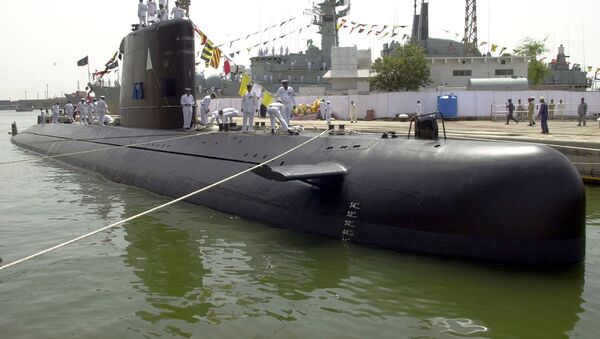Pakistan's fast-attack submarine PNS Saad vanished from Pakistani territorial waters shortly after the Indian Air Force conducted an air raid on a suspected terror camp in Balakot on 26 February following a deadly suicide bomb attack on a convoy of Indian military personnel in Pulwama on 14 February, The Times of India reported, citing senior government sources.
According to the media outlet, the Pakistanis might have thought that New Delhi would use its maritime force to retaliate for the Pulwama attack.
"The location near Karachi from where the PNS Saad vanished, it could reach the Gujarat coast in three days and the headquarters of the western fleet in Mumbai within five days and was seen as a major threat to the security of the country", the sources were cited as saying.
The missing non-nuclear submarine powered with an air-independent propulsion system reportedly forced the entire Indian Navy to engage in extensive searches.
"All the areas where it could have gone in the given timeframe, extensive searches were carried out by the Indian Navy. P-8Is were pressed into service to locate the submarine along with the coastal areas of Gujarat followed by Maharashtra and other states", the sources said.
The Navy is said to have taken all "precautionary measures" to ensure that even if the Pakistani submarine had entered Indian waters, all steps were taken to make it surface.
New Delhi allegedly dispatched its nuclear submarine INS Chakra and diesel-electric attack submarine INS Kalvari along the Pakistani waters and instructed to keep an eye on the movement of the missing warship.
As days passed by, the Indian Navy continued to expand the search area and used satellites to try and locate it, with doubts creeping in that the submarine might be hidden elsewhere, per The Times of India.
After 21 days of large-scale searching, the Indian Navy ostensibly managed to locate the PNS Saad on the western side of Pakistan. The submarine is believed to have been sent there to ensure a covert capability in case tensions between New Delhi and Islamabad spiralled out of control in the aftermath of the Balakot strikes.
The tensions between the two neighbours, who have been embroiled in a conflict since 1947, were exacerbated by a deadly suicide bomb attack allegedly claimed by Pakistan-based Jaish-e Mohammad on a convoy of Indian military personnel in Pulwama on 14 February.
In response to the attack, the Indian Air Force conducted an air raid on a suspected terror camp in Balakot, Pakistan on 26 February, later claiming it had killed 300 terrorists.
Pakistan has denied the existence of any such camps in the area, with regional media outlets citing locals as saying that besides hitting some 15 pine trees, only one elderly villager was hurt in the air raid. The following day, the two countries' aircraft engaged in a fierce dogfight over Kashmir; since then both sides have been involved in sporadic fighting over the de facto border.


